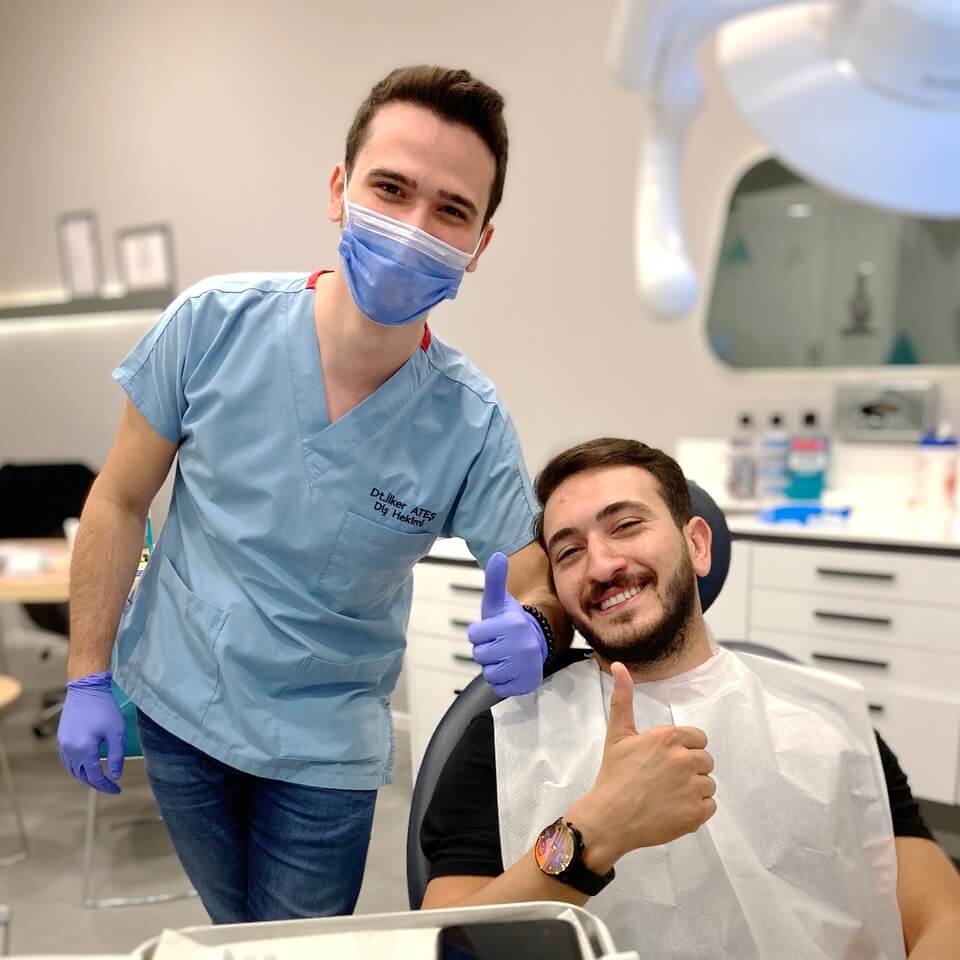What is a Dental Crown?
A dental crown, or a dental cap, is a prosthetic restoration used to cover a damaged or decayed tooth, providing protection and reinforcement. This procedure typically involves several steps, including tooth preparation, impression-taking, crown fabrication, and final placement by a dentist or prosthodontist. These crowns can be made from various materials such as porcelain, ceramic, metal, or a combination of materials, each with advantages and costs.
In dentistry, dental crowns are commonly used for natural teeth and dental implants, providing a natural-looking replacement tooth. So who needs a dental crown? Different types of crowns are available to suit individual needs and preferences, including full metal crowns, porcelain-fused-to-metal crowns, all-ceramic crowns, and composite resin crowns. However, considering the pros and cons of dental crowns; they have disadvantages, such as the potential for tooth sensitivity, the frisk of decay at the crown margins, and the need for replacement over time due to wear or damage.
Types of Dental Crowns
Dental crowns come in various types, each offering unique advantages and considerations. Porcelain-fused-to-metal crowns combine the strength of metal with the aesthetic appeal of porcelain, making them suitable for both front and back teeth. All-ceramic or all-porcelain crowns provide a highly aesthetic option with excellent translucency, ideal for front teeth crowns where natural appearance is crucial. Metal crowns, such as gold or other metal alloys, are renowned for their durability and longevity. They are often used in areas with heavy biting forces. Additionally, composite resin crowns offer a more affordable option. They can be color-matched to natural teeth but may not be as durable as other materials and are more prone to staining.
1. Metal Crowns
Metal crowns, such as gold or metal alloys, are known for their exceptional durability and longevity, making them a popular choice for restoring molars and teeth subjected to heavy biting forces. These dental crowns require less tooth structure removal than other types, preserving more of the natural tooth. While they may not be as aesthetically pleasing as other options due to their metallic appearance, metal crowns offer unmatched strength and resilience, often lasting many years with proper care.
2. Pressed Ceramic Crowns
Pressed ceramic crowns are all-ceramic crowns fabricated using advanced technology to achieve exceptional strength and aesthetics. These dental crowns are created by pressing ceramic material into a mold under high pressure and heat, resulting in excellent durability and a natural-looking restoration. Pressed ceramic crowns are often preferred for restoring front teeth where esthetics are paramount, as they closely mimic the translucency and color of natural tooth enamel.
3. Porcelain-Fused-to-Metal PFM Crowns
Porcelain-fused-to-metal (PFM) crowns are a versatile alternative for both front and back teeth restorations because they combine the strength of metal with the cosmetic appeal of porcelain. These dental crowns feature a metal substructure for durability and support, with a layer of porcelain fused to achieve a natural tooth-like appearance. While PFM crowns offer excellent strength and durability, the metal substructure may sometimes cause a dark line at the gumline, particularly if the gums recede.
4. All-Ceramic or Porcelain Crowns
Porcelain or all-ceramic crowns are known for their outstanding aesthetic appeal, which makes them the perfect option for front tooth restorations where aesthetics is important. Unlike porcelain-fused-to-metal crowns, they do not have a metal substructure, eliminating the risk of a dark line at the gum line and allowing for greater translucency, resembling natural tooth enamel. These highly durable crowns are biocompatible, providing a long-lasting solution for patients seeking functional restoration and cosmetic enhancement.
5. Same-Day Dental Crowns
Using cutting-edge CAD/CAM technology, same-day crowns, sometimes called single-visit crowns, are created and installed in a single dental consultation. This innovative approach eliminates the need for temporary crowns and multiple dental visits, offering patients convenience and efficiency. While same-day dental crowns may have limitations in material options compared to traditional crowns fabricated in a dental laboratory, they provide a quick and reliable solution for restoring damaged or decayed teeth.
6. All-Resin Crowns
All resin crowns are made entirely of composite resin material, offering a cost-effective option for dental restoration. These crowns are typically less expensive than other types of crowns and can be color-matched to natural teeth for improved aesthetics. While they may not be as durable as metal or porcelain crowns and are more prone to wear and staining, they are still viable for restoring front teeth where appearance is a primary concern.
7. Temporary Crowns
Temporary crowns are interim restorations placed over prepared teeth, while permanent crowns are fabricated in a dental laboratory. These dental crowns protect the prepared tooth and help maintain proper spacing and occlusion until the final restoration is ready. Typically made from acrylic or stainless steel, temporary crowns are designed to be temporary solutions and are not as durable or aesthetically pleasing as permanent crowns.
Dental Cap vs. Crown: What is the Difference?
A dental restoration is frequently referred to by the words “dental cap” and “dental crown” interchangeably. Any prosthetic covering that is used to restore the size, strength, and look of a tooth that has been injured or decayed is referred to by both titles. Some dentists may use the term “cap” colloquially, while “crown” is the more commonly used clinical term to describe this type of dental treatment. Essentially, there is no difference between a dental cap and a crown; they serve the same purpose and involve the same procedure.
| Feature | Dental Cap | Dental Crown |
|---|---|---|
| Material | Ceramic, metal, or composite | Ceramic, metal, or composite |
| Purpose | To cover and protect the tooth | To rebuild and protect the tooth |
| Usage | Covers only the top portion of the tooth | Covers the entire tooth |
| Application | Typically used for cosmetic purposes | Used for aesthetic or therapeutic purposes |
| Durability | Less durable | More durable |
| Cost | Generally more affordable | Generally more expensive |
| Procedure | Less invasive procedure | More invasive procedure |
| Preparation | May require minimal tooth preparation | May require more extensive tooth preparation |
What our patients say?



How to Clean a Dental Crown?
Dental crowns can be cleaned like natural teeth with regular brushing and flossing. Use a soft-bristled toothbrush and non-abrasive toothpaste to clean around the crown gently. Regular dental check-ups are essential for maintaining the crown’s and surrounding teeth’ health.
How Long Do Dental Crowns Last?
The material used, personal habits, and oral hygiene routines are some variables that affect how long dental crowns last. These crowns can last between 5 to 15 years or more with proper care. Regular dental check-ups and maintenance can help prolong the crown’s life by addressing issues early on. However, eventual replacement may be necessary due to wear and tear or changes in the surrounding teeth.
Some Complications of Having A Dental Crown
Crown complications can include tooth sensitivity, gum inflammation, and risk of decay around the crown margins. Additionally, crown loosening or dislodgment may occur due to poor fit or underlying dental issues. Occasionally, fractures or chipping of the crown material can also occur, requiring repair or replacement.
Other Treatment Options Alternative to Dental Crowns
Alternative treatment options for dental crowns include dental veneers. The difference between dental veneers and crowns lies in their application. Dental veneers are thin shells placed over the front surface of teeth to improve appearance, and dental bonding, where tooth-colored resin is applied to reshape or restore teeth. In some cases, dental implants, bridges, or crowns may be considered to replace missing teeth, weighing the pros and cons between dental implants and crowns. Each option has advantages and suitability depending on the individual’s dental needs and preferences.
FAQs About Dental Crowns
Crowns can become loose or fall out due to various factors such as decay, trauma, or improper fit, but they generally stay securely in place with proper care and maintenance.
Yes, it’s possible to develop tooth decay under a crown if a gap or the dental crown becomes loose, allowing bacteria to enter and cause decay. Frequent dental examinations can aid in identifying and averting this problem.
For a crown, enough tooth structure must typically remain to support it securely. Usually, around 2 millimeters of healthy tooth structure is needed. However, this requirement can vary depending on the specific situation and the type of crown being placed.
Dental crowns are designed to be strong and durable, often made from materials like porcelain or metal alloys, which can be stronger than natural tooth enamel. However, while they may be more resistant to certain types of damage, they still require proper care to maintain their strength and longevity.
Yes, you can typically eat after getting a crown. Still, waiting until any numbness from the dental crown procedure has worn off is advisable to avoid accidentally biting your cheek or tongue. Additionally, it’s best to start with softer foods and gradually reintroduce harder or sticky foods as you become accustomed to the crown.
The process of getting a crown generally involves numbing the area with local anesthesia so most patients do not experience pain during the procedure. However, some may feel mild discomfort or sensitivity afterward, which can usually be managed with over-the-counter pain relievers.
Both crowns and veneers can enhance the appearance of teeth, but the choice between them depends on individual factors such as the extent of damage, the desired outcome, and the condition of the natural teeth. Veneers are often more conservative and require less removal of tooth structure, while dental crowns provide more coverage and strength but require more tooth preparation. Ultimately, the decision should be made in consultation with a dentist or cosmetic dentist based on your specific needs and goals.
While same-day crowns offer the convenience of immediate restoration in a single appointment, they may have disadvantages, such as potentially higher dental crown costs than traditional crowns and limitations in material options. Additionally, the quality and longevity of same-day dental crowns may vary depending on the technology and expertise of the dental provider.
Why SmileTeam?
- More than 20 years of expertise
- Hundreds of international patients
- Latest technology and high quality
- Affordable treatments
- Free consultation

